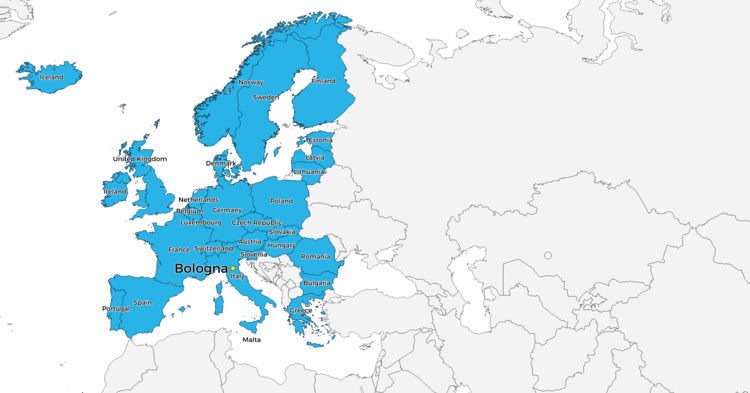- EHEA
- TOPICS
-
Groups
-
Working Group on Monitoring the Implementation of the Bologna Process
-
Working Group on Fundamental Values
-
Working Group on Internationalisation and Mobility
-
Coordination Group on Global Policy Dialogue
-
Task Force on the Future of Bologna
-
Task Force on establishing a long-term Secretariat
-
Advisory Group on ECTS User's Guide Revision
- Bologna Implementation Coordination Group
-
Final Reports 2021-2024
-
2021-2024 working structures
- Working Group on Social Dimension
- Task Force on the Review of the Rules and Regulations...
- Ad Hoc Task Force to Increase Synergies Between the EHEA...
- Task Force on Enhancing Knowledge Sharing in the EHEA community
- Working Group on Learning & Teaching
- EHEA Network of National Correspondents for Qualifications Frameworks
- Working Group on Roadmap for San Marino's accession to the EHEA
-
Working Group on Monitoring the Implementation of the Bologna Process
- EVENTS
-
NEWS

Joint declaration of the European Ministers of Education - The Bologna Declaration of 19 June 1999.
The aims of the Sorbonne Declaration were confirmed in 1999, through the Bologna Declaration, where 29 countries expressed their willingness to commit to enhance the competitiveness of the European Higher Education Area, emphasising the need to further the independence and autonomy of all Higher Education Institutions. All the provisions of the Bologna Declaration were set as measures of a voluntary harmonisation process, not as clauses of a binding contract.
1999 Bologna Declaration - English
While affirming our support to the general principles laid down in the Sorbonne declaration, we engage in co-ordinating our policies to reach in the short term, and in any case within the first decade of the third millennium, the following objectives, which we consider to be of primary relevance in order to establish the European area of higher education and to promote the European system of higher education world-wide.
Adoption of a system of easily readable and comparable degrees, also through the implementation of the Diploma Supplement, in order to promote European citizens employability and the international competitiveness of the European higher education system.
Adoption of a system essentially based on two main cycles, undergraduate and graduate. Access to the second cycle shall require successful completion of first cycle studies, lasting a minimum of three years. The degree awarded after the first cycle shall also be relevant to the European labour market as an appropriate level of qualification. The second cycle should lead to the master and/or doctorate degree as in many European countries.
Establishment of a system of credits - such as in the ECTS system - as a proper means of promoting the most widespread student mobility. Credits could also be acquired in non-higher education contexts, including lifelong learning, provided they are recognised by receiving Universities concerned.
Promotion of mobility by overcoming obstacles to the effective exercise of free movement with particular attention to:
- for students, access to study and training opportunities and to related services
- for teachers, researchers and administrative staff, recognition and valorisation of periods spent in a European context researching, teaching and training, without prejudicing their statutory rights.
Promotion of European co-operation in quality assurance with a view to developing comparable criteria and methodologies.
Promotion of the necessary European dimensions in higher education, particularly with regards to curricular development, inter- institutional co-operation, mobility schemes and integrated programmes of study, training and research.
The organisation of the process was decided by the EU Ministers in September 1999 and a work programme was established by the follow-up group in November 1999.
Bologna Declaration signatories: Austria - Belgium - Bulgaria - Czech Republic - Estonia - Denmark - France - Finland - Germany - Hungary - Greece - Ireland - Iceland - Latvia - Italy - Luxembourg - Lithuania - Malta - the Netherlands - Norway - Poland - Portugal - Romania - Slovak Republic - Slovenia - Spain - Sweden - Swiss Confederation - United Kingdom

